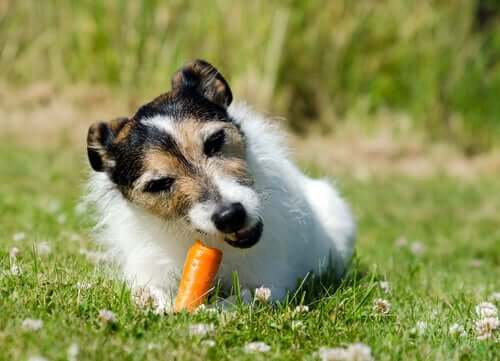The Benefits of Carrots for Your Dog


Written and verified by the lawyer Francisco María García
Are carrots good for your dog? Indeed they are. Just like with human beings, the benefits of carrots for dogs are numerous and varied. However, there are some considerations to take into account. Consuming this vegetable can also have some side effects. And, as with any other food, excess consumption can have extremely unfavorable results.
The benefits of carrots for dogs
The nutrients that this tasty veggie contains are vital to dogs’ health.
As for their benefits, carrots are rich in vitamin A, B, C, D, and K, among others. They also contain minerals like phosphorus, calcium, sodium, potassium, and chlorine. This is a good combination of natural elements that strengthen the immune system.

Carrots are an excellent complement to dental health, along with a toothbrush and the use of toys made of natural cork or nylon. Your dogs can chew on carrots frequently, and this will help get rid of plaque build-up on their teeth, molars, cuspids, and gums.
Carrots are very useful for dogs that always seem to be hungry. What’s more, they are low in calories, contain no fat, and are very hydrating. All of these factors make them an ideal to offer dogs that are overweight.
Important benefits of carrots for canine health
For animals that are anxious, giving them a carrot will calm their nerves and regulate the nervous system.
Studies have also proven the regenerative properties of carrot on the skin of dogs. They have revealed their capacity to reduce the occurrence of skin afflictions. Some specialists have even endorsed carrots as a dietary supplement in cases of dogs that have suffered burns.
When it comes to our pets’ vision, carrots can treat eye irritation. What’s more, they can reduce the risk of the appearance of cataracts.
In pregnant dogs, these vegetables are an unbeatable source of nutrition. They increase the volume of blood flow and, at the time, stimulate milk production.
This root crop is also rich in beta-carotene, a nutrient known as Pro-vitamin A. It functions as an antioxidant against free radicals produced by the body. In the same way, they work against those produced by external agents, such as the sun, tobacco, and environmental pollution.
Finally, they also contribute positively to the strengthening of bones, as well as actively helping to prevent the formation of tumors and the development of cancer.
Raw or cooked
Dogs can eat carrots either cooked or raw. Some veterinarians claim it’s better to serve them in their natural state. This is because they lose a lot of nutrients in the cooking process. Furthermore, when they become soft, they no longer help to clean your dog’s teeth.
For those to opt for cooking these vegetables, it’s important to only cook them a little. Don’t use salt or any other spice. In either case, be sure to wash them well. This will help to remove any lingering pesticides and other chemical substances used for harvest.
Whether raw or cooked, carrots are a magnificent substitute for the doggy treats that owners usually give their dogs. Besides being cheaper and easier to store, their nutritional benefits are incomparable. Dogs can spend hours chewing on these orange roots without getting bored.
Many families have small children who are in the process of learning to eat vegetables. If that’s the case in your home, you can implement games where your child shares their carrot with the dog.
One thing to remember, to avoid alarm, is that a dog’s feces often turn orange after eating carrot.
Side effects
Not all dogs can eat this vegetable. Pets with diabetes or digestive problems should never eat carrots.

As mentioned earlier, owners should avoid giving excessive amounts of carrot to their dogs. This is because it can cause considerable blood sugar increases in non-diabetic dogs.
A dog can end up with swollen intestines as a result of eating too much carrot. Extravagant amounts of carrot end up making it hard to process all of the components properly. As a result, dogs often end up with diarrhea.
There are many adverse effects when it comes to dogs eating too much of this vegetable. Excessive amounts of vitamin A can lead to bone problems and muscle weakness.
Most specialists see no problem in giving carrots to dogs, as long as it’s done in moderation. You can give them to your dog as a snack or reward.
There is a group of specialists that claims that dogs can eat this vegetable twice every day. Others, however, are more reserved, affirming that dogs should only have one every two or three days. To date, there is no unanimous opinion on the matter.
Are carrots good for your dog? Indeed they are. Just like with human beings, the benefits of carrots for dogs are numerous and varied. However, there are some considerations to take into account. Consuming this vegetable can also have some side effects. And, as with any other food, excess consumption can have extremely unfavorable results.
The benefits of carrots for dogs
The nutrients that this tasty veggie contains are vital to dogs’ health.
As for their benefits, carrots are rich in vitamin A, B, C, D, and K, among others. They also contain minerals like phosphorus, calcium, sodium, potassium, and chlorine. This is a good combination of natural elements that strengthen the immune system.

Carrots are an excellent complement to dental health, along with a toothbrush and the use of toys made of natural cork or nylon. Your dogs can chew on carrots frequently, and this will help get rid of plaque build-up on their teeth, molars, cuspids, and gums.
Carrots are very useful for dogs that always seem to be hungry. What’s more, they are low in calories, contain no fat, and are very hydrating. All of these factors make them an ideal to offer dogs that are overweight.
Important benefits of carrots for canine health
For animals that are anxious, giving them a carrot will calm their nerves and regulate the nervous system.
Studies have also proven the regenerative properties of carrot on the skin of dogs. They have revealed their capacity to reduce the occurrence of skin afflictions. Some specialists have even endorsed carrots as a dietary supplement in cases of dogs that have suffered burns.
When it comes to our pets’ vision, carrots can treat eye irritation. What’s more, they can reduce the risk of the appearance of cataracts.
In pregnant dogs, these vegetables are an unbeatable source of nutrition. They increase the volume of blood flow and, at the time, stimulate milk production.
This root crop is also rich in beta-carotene, a nutrient known as Pro-vitamin A. It functions as an antioxidant against free radicals produced by the body. In the same way, they work against those produced by external agents, such as the sun, tobacco, and environmental pollution.
Finally, they also contribute positively to the strengthening of bones, as well as actively helping to prevent the formation of tumors and the development of cancer.
Raw or cooked
Dogs can eat carrots either cooked or raw. Some veterinarians claim it’s better to serve them in their natural state. This is because they lose a lot of nutrients in the cooking process. Furthermore, when they become soft, they no longer help to clean your dog’s teeth.
For those to opt for cooking these vegetables, it’s important to only cook them a little. Don’t use salt or any other spice. In either case, be sure to wash them well. This will help to remove any lingering pesticides and other chemical substances used for harvest.
Whether raw or cooked, carrots are a magnificent substitute for the doggy treats that owners usually give their dogs. Besides being cheaper and easier to store, their nutritional benefits are incomparable. Dogs can spend hours chewing on these orange roots without getting bored.
Many families have small children who are in the process of learning to eat vegetables. If that’s the case in your home, you can implement games where your child shares their carrot with the dog.
One thing to remember, to avoid alarm, is that a dog’s feces often turn orange after eating carrot.
Side effects
Not all dogs can eat this vegetable. Pets with diabetes or digestive problems should never eat carrots.

As mentioned earlier, owners should avoid giving excessive amounts of carrot to their dogs. This is because it can cause considerable blood sugar increases in non-diabetic dogs.
A dog can end up with swollen intestines as a result of eating too much carrot. Extravagant amounts of carrot end up making it hard to process all of the components properly. As a result, dogs often end up with diarrhea.
There are many adverse effects when it comes to dogs eating too much of this vegetable. Excessive amounts of vitamin A can lead to bone problems and muscle weakness.
Most specialists see no problem in giving carrots to dogs, as long as it’s done in moderation. You can give them to your dog as a snack or reward.
There is a group of specialists that claims that dogs can eat this vegetable twice every day. Others, however, are more reserved, affirming that dogs should only have one every two or three days. To date, there is no unanimous opinion on the matter.
This text is provided for informational purposes only and does not replace consultation with a professional. If in doubt, consult your specialist.








